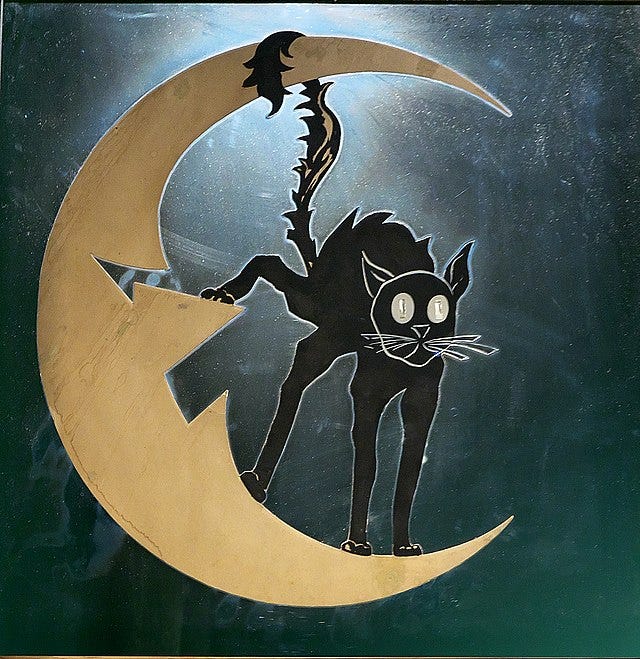What to do about Katrina, Intermission #1
Some burbling about writing, and the story so far
It has been a bit of a time coming, but welcome to this intermission. There will probably be more of them as and when.
This will, I have come to comprehend, serve a fairly useful purpose, especially in light of some of the reservations I developed about continuing this series here on Substack. Which was one of the reasons we’ve had this little break in the first place. So it behooves me to explain.
First, there is a fairly obvious point that as I pick up more subscribers (believe it or not that does happen!), and as the story gets longer, it’s not going to be feasible, or rather I simply can’t expect that every new subscriber will be minded to go right back to the beginning and read it from there. Thus, having intermissions now and then in which I can relate the so-called story so far means those new subscribers don’t have to go back to the start (although if these reminders do their job well then it might entice them to do so, you never know). Thus far, after all, there is already some fifty thousand words.
The second reservation I had about it concerns the pacing. There is nothing wrong with this pacing by the way, it is as intended, just that it was never really conceived as a serialised publication. If one had the opportunity to sit down with the completed book in one’s paws then it wouldn’t seem like a slow pace at all, really. It might take you, I don’t know, 5-10 hours’ worth of reading time depending on how fast you read, which for a lot of people wouldn’t be more than a day or three. Compared to over two or three months as a serialisation.
So I was getting the impression that serialisations here on Substack need to have some kind of quicker narrative to them, in which exciting stuff seems to happen at least every few episodes. And this is not the story I wanted to tell. Of course there would be exciting episodes, but they would not be the central feature of the thing.
In writing these long-form stories I come firmly from a sort of classic literature tradition, having been autodidactically raised on the likes of Kafka and Dostoyevsky and all the rest of them. The sort of writing where the storyline is of almost secondary importance next to the meaning, or ideas the writer wanted to convey. That is to say the kind of novels which demand you pay attention, because they are peppered with philosophical pearls designed to make you think – even stop and think – and which hopefully promise to stay with you for the rest of your life. Whether couched as an almost throwaway observation or inserted into a piece of dialogue which you might otherwise think had no relevance whatsoever to the key narrative theme.
Literary fiction, for sure, but not – it should be said – the pretentious self-indulgent kind. I have never believed it true that ‘everyone has a novel inside them’. And for those who do, not all of them can turn it into something worth reading. Let alone produce more than one.
Perhaps if I refine our terms it might help to explain what I’m getting at here. See, I would say there is a difference between a storyteller and a writer. It may well be true that ‘everyone has a story in them to tell’ (because everyone’s life is a story), but that’s certainly not the same as saying ‘everyone has a novel in them’ or ‘everyone can be a writer’. To say the latter is part of the deception that forms this money-making scam, in which people can go on courses which promise to tell them ‘how to write’. They don’t do that. They might tell them ‘how to tell a story’, but as I say, that’s not the same thing. Writers have a certain feel for writing, and you can tell who they are when you read their stuff, because it stands out and you are aware of the individual behind the writing. So the truth is that no one can teach someone ‘how to write’ – you either have it or you don’t. Sure, it can be worth writers learning stuff like narrative theory, but don’t, for love nor money, go on any of these stupid courses.
A lot of people also seem to employ editors to dissect their output. Then they end up rewriting it. I am also getting the anecdotal impression that editors from publishing houses also get people to rewrite stuff more than once and cut out huge chunks and so on. That’s commercialism for you, I suspect. I personally couldn’t ever cope with that, as I would find it insulting. I mean, can you imagine any of those classic great writers putting up with shit like that? I wouldn’t. Likewise I don’t really edit. Because, as a writer, it comes out well enough the first time. I will certainly do a light edit for typos and maybe a few punctuation changes here and there, but if anything I will add stuff, rather than remove. And I don’t rewrite. I don’t need to.
Which is perhaps a third category – those who are elegant wordsmiths. Those for whom, likewise, the storyline is of secondary importance next to the wonderful and elegant use of language. Let us call them poets, perhaps. Or poetic prose artists.
Similarly, perhaps the best writers are capable of all three – storytelling, writing, and wordplay. You can teach the first, for sure, but not the other two – one either has that, or one doesn’t.
This is not to say I denigrate storytellers. Absolutely not. I have a great respect for them and am subscribed to some very good ones here on Substack, and if I am honest, those people are arguably better storytellers than I am. Furthermore, as a student or scholar of human history – let’s call it anthropology or psychohistory – I am well aware that storytelling is the oldest profession not involving the supply of physical needs. No, it’s not ‘prostitution’ – that’s your Victorian patriarchal misogynists speaking. So forget that shit.
But this is why I have always been interested in subjects like philosophy and psychology and suchlike. Conspiracy theories too, for that matter. I do sometimes wonder, on that note, why storytellers aren’t necessarily interested in conspiracy theories. At the base level a conspiracy theory is, after all, just a story, true or not. Yes, it has a narrative purpose, and a theme and a meaning and an intentional purpose, perhaps, which makes the best ones somewhat writerly, ironically, but in the end, they are just intriguing stories.
I mention all this stuff because all these considerations are kind of the reason why I do hope some of my lovely subscribers will want to read my story from the beginning. I can’t, after all, in these periodic reviews, reproduce all of those ideas.
That, however, as I say, is not all of them. Some people just want a good story. So there is a sort of compromise option, in which I attempt to tell a good story without losing any of those ideas, let alone the literary merit. Because this story was conceived as a sort of philosophy or psychology, plus a somewhat obvious observation on dystopia, and why it is so, which contributes to an understanding of how to remedy it. That latter aspect, you will find, also happens to be a central feature of the iconoclastic storyline. Stranger in a strange land, sort of thing.
Likewise, if you engage the reader with a good storyline then they are more likely to pick up on the important ideas. With that in mind, the pace is going to be quickening soon enough – well, immediately, actually – but then after the end of Act One it is going to take a decidedly dark turn. There may well be some sex, drugs, possibly some rock n’ roll, and some people are definitely going to die. At least in the second half of Act Two. I also decided to introduce you to some new characters earlier than I originally intended, and similarly I will provide you with an answer to one of the key questions. Although then there will be a twist, because there’s always a twist. Having said that, teasingly, we are going to be taking a diversion for the first half of Act Two, which I really can’t spoil for you. So I do hope you’ll stick with it. And you can, naturally, always go back and read from the beginning.
I have always thought that the really good books out there are the ones you can re-read. Perhaps that’s another aspect of what we mean by the word classic.
The other reason why I found myself depressed by various concerns was that this story is envisaged to be a very long series. Extremely immersive and deep and replete with those ideas, as well as a real character study. As such, is it really suitable for a Substack serialisation? I mean, if I was ever to finish the damn thing, it would take years to do so. With over a dozen episodes (books, that is) the total word count would run into the millions, and even at, say, four or five thousand words posted each week we’re talking up to twenty years. Leaving aside the fact that I can hardly expect my subscribers to stay here for twenty years, I very much doubt there even will be a Substack in twenty years’ time, and even if there is, it will look completely different. So-called creators will simply be typing in their stuff into some AI movie generator and so, well, what happens to the classic novel then? How many will actually read something designed to possess real depth or profundity?
Then there’s the VR issue. With all its inherent addictions.
Some might suggest there is a conspiracy there.
But let’s not dwell on that.
Just to update you on where I am with the writing, I have a good enough outline for the rest of Act One, with maybe two-thirds of it still to be written. This is probably about twenty thousand words, but I can easily dash them off in a week (if I don’t drink too much). Besides, forcing myself with deadlines is the best way to get me writing, especially because I don’t want to let down any of my readers. I have the next five scenes done, so that’s enough for a good few weeks. Which means I can indeed re-start the thing now.
Anyway, just to warn you, if you are indeed minded to start from the beginning, then the following recap will be spoilers. If you don’t mind that, and would like to simply jump in, then that won’t be a problem, and I will simply relate all the important plot and character points so far. This can also of course be a succinct reminder for those of you who have been reading it.
In which case, without further digression from me, here is a brief outline of the story so far.
Our anti-heroine, Katrina, a beautiful dark-haired, dark-eyed girl on the edge of eighteen, presents herself at the British Embassy in Paris on 16 November in your year 2021. She claims three odd things – she is from a parallel world, she must’ve de-aged 31 years when she transitioned into this world (she gives her birthday as 10 December 1972), and she has antibodies to ‘every coronavirus on this planet, including variants which haven’t been unleashed yet’. She had noticed there was a pandemic going on (this is not the case in her world). She actually woke up in the departures area of the Gare de l’Est at 08:14, and almost immediately realised she was in a parallel world, thus didn’t take too much time to decide to come to the Embassy. She has no ID or money or anything, after all, so the only alternative would’ve been a life under the radar in the underworld, as it were. On her way to the Embassy she conveniently found a newspaper on a bench in a park, so she stopped to read it to at least get some information on this world, so as not to be too unprepared.
The first thing she does, however, on exiting the station, is visit a Catholic church, where she finds a little shrine to the Goddess (the Virgin Mary, that is), and communes with her. The impression she gets from the Goddess, whose voice she can hear from time to time when she asks questions, is that there may be someone in the Embassy who can help her, and that perhaps she is only here to do her penance.
Needless to say they do not believe her, first thinking it’s some sort of prank, until Katrina creates a bit of scene and insists on talking to someone. Security manage to calm her down and escort her into a side room, where she is soon met by a young MI5 officer called Tom, who seems to remind Katrina of someone she once knew who was dear to her. Tom is in his mid-twenties, with bright eager blue eyes and a very affable manner (yes, of course he’s handsome! But don’t get too many ideas into your head, reader dear). At least he does his best to be affable until Katrina starts becoming insufferable later. Tom is equally sceptical, although manages to maintain a professional attitude at this point and takes some biographical details from her, like her parents’ names.
Katrina initially thinks that Tom might be the person who can help her, especially as he reminds her of someone.
He then reports back to Peter, MI6’s chief resident, who is immediately suspicious (although he is generally suspicious of everyone until proven otherwise). He orders Tom to take her out to lunch (she’s already out to lunch, clearly). At lunch, Katrina succeeds in unsettling Tom with her manic behaviour, drinking an entire carafe of red wine, being alternately stressed then switching to humble apologetic mode. Katrina spots two other agents in the brasserie listening in on their conversation (Tom is wearing a standard issue watch – the one with the microphone – which she notices). Katrina says she wants British citizenship, a ticket to England so she can go and live back in Cambridge, and some money to start her new life. She is in part taking the piss when she cites a figure of a cool million.
After lunch, they decide to put Katrina into a hotel for the night, with two chaperones watching over her (a man and a woman from the Security section). Tom gives her some cash to buy some essentials.
Tom is a little highly strung because he has issues, and really doesn’t need a mad girl from a parallel world complicating everything at this time in his life. These issues involve his unsure relationship with a young French girl called Audrey who works at the Consulate, and the fact that he is seriously questioning whether a career in the Service is what he really wants from life. He is aware that he was only recruited because his father is an intelligence officer (actually for MI6 – Peter knows him). It’s not that Tom idolises his father, but simply wouldn’t want to disappoint him. Tom’s father started off as a field agent, but then quit the field when his wife fell pregnant with Tom. We don’t know the names of Tom’s parents yet, by the way.
So, Tom asks Audrey to check out Katrina’s details. Audrey can’t find any records of her or the names of the parents she provides, so tells Tom he’ll have to do his spy stuff, as she doesn’t have that sort of clearance level. Later, they will spend the evening together once Tom has deposited Katrina at the hotel.
They provide Katrina with a phone, with which she finds out a bit more about the world by surfing the Internet, partly for the names of people she knows in her world. She is also perfectly aware of the fact that they gave her the phone to find out what she gets up to on the Internet, so she is mindful of this with her browsing. She specifically avoids looking up certain names like ‘Sarah Bishop’, let alone KGB codenames from the Mitrokhin Archive, which it turns out does exist in this world – it quickly becomes apparent to her that the two worlds’ histories are somewhat identical up until about thirty years’ ago, and that this is a world in which she never existed.
The final important plot point for Day One is Tom getting in touch with Malcolm Gladwish, a psychologist who also does work for the intelligence services (thus has the necessary clearance). Malcolm is quite an outdoorsy sort, from the Lake District, currently on a little cycling holiday in Brittany. He says he can be in Paris tomorrow, and needs no further enticement or motivation once Tom gives him some basic details about this strange girl. Malcolm’s instinctive initial guess/hypothesis is that Katrina has some kind of dissociative condition, by virtue of the memory loss about ever having had a life in this world. It goes without saying he, too, is initially dismissing the idea that she really is from a parallel world. This sort of high-level dissociation is usually the result of a serious trauma.
Day Two starts with Tom having to go to the station to get hold of the CCTV. Katrina returns to the Embassy. They have no records of anyone matching her parents, although her grandfather, Kristophe Meyer, is listed as being killed in action on the Eastern Front in 1943 (he was in the German Wehrmacht). Katrina wonders whether, in this life, he didn’t pray before the firefight and was therefore killed by a ricocheted bullet – which, in her world, only grazed his temple. This would be a sort of grandfather paradox.
Other details Katrina gives is that in her world she is perhaps best known as a famous actress and filmmaker. She suggests she is rather rich, as she owns her own production company and streaming service (she says she owns Netflix, which makes Tom laugh incredulously). On a more sinister note, she also says she had a husband who was in the KGB, called Sasha Voronin, who was killed in a terrorist attack at the Russian Embassy in London in May 2003, shortly after the Liberal Socialist Party won the British 2003 general election, and Katrina became Russian Ambassador to Britannia, with Sasha as the chief resident (for the SVR – the successor to the KGB). Katrina is in fact bisexual, she says, and she is now married to a woman called Anna Marten (KGB codename MACMILLAN – although she doesn’t mention that). She has three children, Nikita (b. 2003), Yuri (b. 2006), and Alice (b. 2008). Nikita is the natural child of Katrina and Sasha. Yuri, also Sasha’s child, was artificial insemination (immaculate conception, one might say), whilst Alice’s father is Anna’s older brother. Naturally, the fact she says she was married to a KGB officer further raises Peter’s suspicions. Anna, it turns out, does not exist in this world. Sasha, however, does (although they withhold this information from Katrina for the time being). And he was the SVR’s chief resident in the London Embassy until he was expelled along with numerous other Russian diplomat-spies following the Skripal incident in 2018. Which is ironic, given that a similar fate happened to Sasha’s uncle Yuri in the early 1970s.
Katrina expresses a desire to go swimming, which Audrey is supposed to arrange. She meets Katrina on Day Two in order to take some blood samples (for the antibody tests, and of course it means they now have her DNA), and does a basic physical exam (there’s nothing physically wrong with her). Whereas Audrey had been under the impression this was just a mad girl, after meeting her she feels differently, and becomes very sympathetic and friendly towards Katrina. Audrey too is having doubts about Tom – in her view, she loves him more than he loves her. Katrina tells her life is too precious to waste a single drop. If she was honest, of course, Audrey had already made up her mind. We also discover that Audrey’s parents, who are doctors, had refused to take the mRNA injections and lost their jobs as a result. Audrey herself has a fake jab certificate. Katrina has already stated that she views the jabs as a biochemical weapon – thus they also see her as a sort of conspiracy theorist.
In the meantime, Tom has lunch with his counterpart from the Irish Embassy, Sean Macavity, who may come across as simply fun and lackadaisical, but is really quite cunning. Tom is at least half-aware that Sean likes to milk him for information, but in general doesn’t really care. Sean will be looking into the woman Katrina named as her (Irish) mother, Ursula Catriona Sugrue, who it turns out, once they used her maiden name, does exist in this world, although she was born in December 1948 and so must’ve been post-menopausal when Katrina was probably born (early 2000s, judging by her appearance). Perhaps Katrina is a granddaughter. There will have to be a DNA test of course.
Or at least, Ursula did exist. It turns out she died several months earlier, of ‘Covid-related causes’, according to the death certificate. This would perhaps psychologically explain Katrina’s anti-vaxx conspiracy theory. They haven’t told Katrina about this yet, though.
Sean also theorises that Peter himself may be behind whatever nefarious conspiracy is afoot here, and suggests to Tom that they think about following Peter to try and discover what he’s up to.
Katrina is able to go swimming in the afternoon, and it turns out she’s pretty good at it.
The most important development on Day Two is when Tom analyses the CCTV, whilst Malcolm conducts his first interview with Katrina. The CCTV is a case of ‘now you don’t see her, now you do’, as she suddenly materialises, then looks up and stares directly at the camera. Peter, naturally, is convinced it was doctored – meaning all his suspicions were justified, equally meaning he is justified in transferring the girl to a safehouse (which she is, later that day).
Peter meets Katrina at this point and is part of her escort to the safehouse. They have a curious conversation in which they talk about spy stuff (like Wikileaks and the lea of the CIA’s Vault Seven (surveillance capabilities) – Katrina thinks Wikileaks, which doesn’t exist in her world, sounds like a limited hangout), and Katrina asks whether the place is wired for sound and vision (hidden cameras, listening devices etc.) and Peter doesn’t lie about it. Katrina says in that case she’ll remember it’s not safe to talk. Perhaps Katrina recognises Peter…
Malcolm says even if it is doctored that doesn’t mean Katrina knows anything about it – if she has a dissociative condition. He has also become sympathetic towards her, and perhaps a little defensive on her behalf. Peter, naturally, assumes she is simply a very good actress. Tom, for his part, wants to have his hands completely washed of the entire affair. Peter won’t let him get away that easily, though.
To bring us up to date in the narrative, then, we just left Katrina getting herself settled in the safehouse, which is a pleasant little apartment in the Montmartre (with her two chaperones in the apartment on the floor below), decorated in somewhat haphazard vintage fashion like something out of La Belle Époque, and falling asleep in an armchair with an old copy of Camus’ Myth of Sisyphus on her lap. Her bedroom has a sash window which opens easily. Outside and to the left, she has noted, there is what looks to be a sufficiently sturdy drainpipe descending into the alleyway several storeys below.
Peter, meanwhile, has been summoned to a meeting with Sienna Dexy, the British Ambassador, at her residence up the road from the Embassy. Sienna has naturally heard the gossip about this strange girl from a parallel world, and wants Peter to keep her informed. The possibility is discussed that Katrina may well be the victim of some kind of brainwashing, MK-Ultra style.
When we left the proceedings, at the end of his interview with the Ambassador, Peter was about to head off to a meeting with an old friend. That person’s name is Sarah Bishop, and her KGB codename had been NIMZO…
Well, that’s a pretty adequate run through of the story so far. I think I have noted all the important plot points. I may have missed a few aspects, given it’s some fifty thousand words, but none of that is behind a paywall, so feel free to read it from the beginning if you wish.
The story is going to resume very shortly, with Episode I, Act I, scene 37, in which Peter heads off to meet his old friend. He will not, however, be alone…
Told you I’d pick up the pace.
I hope you enjoy it, and I do hope you’ll stick around. I’m not, as it happens, that bad at storytelling after all…
Just to let you have the link again, if you are minded to start from the beginning, here is my intro, and here’s the Prelude & Scene One. The previous scene 36, where we left off, is there.
And if you haven’t subscribed already, here is a lovely little caption just for you.
Oh - and in consideration of my perpetual caffeine addiction, I am pleased to announce you can buy me a coffee if you wish! Or you can become a paid subscriber and I will do my very best to shower you with exclusive goodies…









I spent approximately 10 minutes reading this post, and I enjoyed every single one, I'll likely be spending a few more hours catching up on the story.
As for the first half, I kept nodding. Editing, in the way it is usually done tends to dilute writing. I've never been a fan of 'polished' pieces, they often feel like they've lost something vital. Maybe that's why I tend to prefer writers' journals to their novels. Then again, maybe their life was the better story all along.
To me, "Editing" is the most important part of "my" writing. I bring no skill to the game other than the fact that I want to product something that is not a constant source of critiquing for the reader. I will include a blurb from my website to illustrate my own thoughts and feelings about writing.
--- The Long Road ---
Wanting to tell a story, verses committing to the idea of writing one, are two very different concepts. How long will the story be? How does one make the story entertaining enough to suck the reader in? How far down the rabbit hole of fiction will the audience allow? Is the character development lacking?
This journey has given me insight regarding my own writing skills. The need to keep a complex story, believable, and yet, resolve the plot-line without leaving a bunch of questionable gaps. “Hurrah! Finished.”
Now comes the editing. Then the realization that the entire second chapter of the first book needs to be eliminated and replaced with something better. This, in turn, forces the rewrite of all three books. Again with the editing. Now try to get someone other than yourself to read the final product and give an evaluation. Good luck with that one.
So, here we are at a point in the road where I present this bit of fiction to the masses.